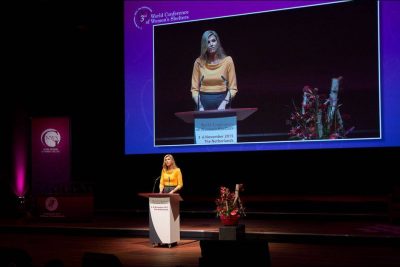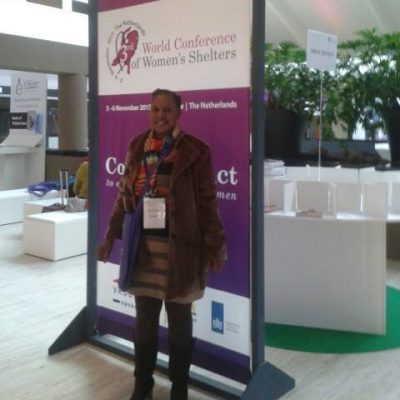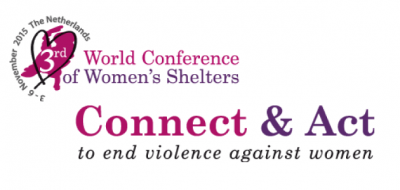By
Mathew Masinge
On request of the Global Network of Women’s Shelters (GNWS), the Dutch Foundation of Women’s Shelters and its partners organised the 3rd World Conference of Women’s Shelters from 3-6 November 2015 in The Hague, The Netherlands.
115 nations supporting an end in violence against women, which included USA, Britain, Australia, Denmark, Germany, Zimbabwe, South Africa, Nigeria and others, took turns to share ideas and agreeing on calling upon Governments, UN Agencies, International Organisations, the Private Sector and Civil Society to take urgent and effective action to prevent and end violence against women and children.
This reporter Mathew Masinge hooked up with one of Zimbabwe’s representative at the conference, Ekenia Chifamba who is the Director of Shamwari Yemwanasikana (SYS), a community based non-profit making organisation that seeks to promote the rights and empowerment of the girl child in the home, school and communities of Zimbabwe.
Mathew Masinge: How did your organisation start and what would is your aim?
Ekenia Chifamba: My unconditional passion to see the girl child liberated and uplifted is what made me start the organisation, also having been involved in working for the empowerment of the girl child in child centered non-profit making organisations for many years. The community I grew up in also contributed to the establishment of SYS. I grew up in the high density suburb of Chitungwiza where a marginal increase in cases involving violence against girls and women was what I came across daily.
MM: I understand you are a well sought women against the girl child abuse. How does that make you feel?
EC: I feel I have a huge responsibility in society and a pivotal role to emancipate the girl child, a role model and anchor to thousands of girls in Zimbabwe.
MM: What inspired your to start your organisation?
EC: To begin with our organisation is inspired by the girls themselves and anything for the girls without the girls is not for the girls.
MM: You were Zimbabwe’s representative at the 3 WCWS. What was your experience like?
EC: Yes I was, it was an amazing experience. An opportunity to share experiences, network and grow professionally. Also present from Zimbabwe was the deputy director for SYS Tanatsa Mparadzi, director of Musasa who is the deputy chairperson of Women shelters in Africa and the Executive director of Women in law Southern Africa also gave a presentation on their interventions.
MM: How did you get to be part of the conference?
EC: We are part of the global network of women’s shelters that connects and acts to end violence against women all over the world. We received an invitation then applied for a scholarship which we were granted. We also submitted a proposal to share our interventions which was accepted amongst thousands.
MM: What was your presentation about and how did the delegates receive it?
EC: Our presentation was about our community based approach to sexual violence. We gave a detailed explanation on our interventions from pre-school, girls clubs, advocacy, community development committees, our work with traditional and religious leaders to address issues of harmful cultural and religious practices. Part of the presentation was about our special income generating projects in community for women meant to economically empower them to support girls education. We also talked about our commitment to victims of abuse whom we escort to the hospital, court, police and offer counseling. We also talked about our programmes that involve men and boys. The delegates received it very well. They were impressed by our interventions and our model. Most of them pledged support and promised to partner in future events even to replicate the model in their own countries.
MM: Given the platform to present your idea back home, would you do it?
EC: Would love that, it would give us the opportunity to come together as women and girls organisations to end violence against women and girls. Former Miss World from India said “Women together is power.”
MM: What are some of your goals as SYS?
EC: Empowerment of the communities.
Girl child emancipation.
Support for sustainable livelihood.
Gender dialogue/Mainstreaming.
Our objectives include: To engage all stakeholders including communities, schools governments and policy makers in advocacy and lobbying, eradication of practices which empede the girl child’s full physical, emotional, spiritual growth and development.
To document and disseminate information on girls’ rights, HIV/AIDS treatment and education and psyco social support. Working with children’s homes and taking them to safe shelters.
To promote the reproductive health of girls through advocating for the provision and improved access to reproductive health facilities.
Please note that as part of our interventions in the victims department we take girls to safe shelters and we are in the process of establishing shelters and empowerment centres for girls in Murewa and Seke. These have vocational training centres for both, but for the one in Seke we intend to have a pre-school, high school and future plans for a clinic
MM: Can we expect any changes on the Zimbabwean women and the girl child any time soon?
EC: Of course, with our interventions of providing a one stop shop and involving everyone surrounding the girl child with the support also of other organisations that promote women’s and girls rights because it’s not a lone battle.
MM: What did you learn most from the conference?
EC: It takes the whole village to raise a child. With combined efforts globally we can achieve and realise a violence free world for women and girls. Girls are the future leaders and again women together is power.
Also present to give speeches were ministers who have women’s portfolios from the Netherlands, South Africa, Australia and Queen Maxima of Sweden and Princess Mary of Denmark. Also present were representatives from the UN, various international organisations, the actress Ashley Judd and representatives from the Dutch police.
The 2015 Data Count of the Global Network of Women’s Shelters, in which 2497 shelters and agencies in 46 countries took part, states that on one day, 53,230 women and 34,794 children sought and acquired shelter services. However, 7,337 women and 4,410 children were turned away due to limited resources and capacity. This validates the need for increased resources and capacity for existing shelters, as well as the need for more shelters.
Therefore, all key stakeholders tare called upon to considerably strengthen efforts in preventing violence and effectively protecting women and girls. In particular, it is demanded that states and all other relevant stakeholders:
-
Sign, ratify and effectively implement relevant conventions and agendas, including:
-
The Convention on Ending all forms of Discrimination Against Women (CEDAW) and it’s optional protocol;
-
The Beijing Platform for Action;
-
The International Convention on Population and Development (ICPD) and it’s Program of Action;
-
All other relevant documents and regional policies and instruments;
-
-
Provide adequate funding for women’s shelters, including by considerably increasing the capacity of women’s shelters;
-
Redirect military spending towards funding for social and economic development, including shelter spaces to save women and children fleeing violence, as outlined in Beijing Platform for Action strategic objective E.2.;
-
Implement a standalone Convention on Violence Against Women which is internationally binding;
-
Hold perpetrators to account and to provide services to assist perpetrators to transform their behaviour and become peer educators.
The following are the main burning issues developed in the regional networks meeting at the 3rd World Conference of Women’s Shelters in The Hague:
Inter-America Region
– Provide sustainable funding for women’s support services;
– Work with women and girls during and after armed conflict;
– Create special international measures for exceptional violence against women in organized crime territories;
– Strengthen international cooperation;
Asia Region
– Ensure economic empowerment through well funded employment, housing and community programs that help women after they leave the shelter to become independent;
– Give women equal property rights, rights to inheritance, affordable housing for survivors of domestic violence, and guarantee the property rights of widows;
– Ensure sufficient funding for shelters;
Europe Region
– Ratify and implement the Istanbul Convention in all countries and implement the CEDAW;
– Focus on CEDAW Article 6 on Trafficking and Prostitution, which reads “States shall take all measures to stop all forms of trafficking and the exploitation of prostitution of women;”
– Increase the number of women’s shelters and specialist women’s services and implement sustainable funding for women’s and children support services, with commitments from Governments to finance specific support services for victims;
Africa Region
– Enact and implement policies and legislation to establish and support shelters and space spaces for women and girls in Africa;
– Strengthen political will and invest/allocate funds for survivors of violence to guarantee service provision and access to safe space;
MENA Region
– Highlight the impact of violence on women as individuals, acknowledging their humanity and shedding light on them as well as the family and society;
– Recognize female victims of harmful cultural practices, such as honor killings and Female Genital Mutilation;
– Ensure that women’s rights to privacy are not violated in the name of security measures;
– Draw attention to the role of media, which portrays a stereotyped image of women and enhances violence;
Indigenous Network
– Call for an international strategy to prevent murdered and missing Indigenous women and children worldwide;
– Demand that all states recognize and apply the UN Declaration on the Rights of Indigenous Peoples;
– Ensure sufficient support for the Indigenous Women’s Shelters Network;
Oceania Region
– Ensure proper resourcing to redress violence against women that is exempt from political cycles, including increased ongoing resourcing for specialist women’s domestic and family violence services for women and their children;
– Provide consistent criminal justice responses that hold perpetrators to account and enable opportunities for change;
– Make Governments accountable for transformative change which focuses on gender, social, political and economic inequalities and Indigenous rights, with a focus on gender and intersectionality, including women from culturally and linguistically diverse backgrounds, women with disabilities, LGBTQIA+ women, and honouring Indigenous rights.





No Comments Yet!
You can be first to comment this post!